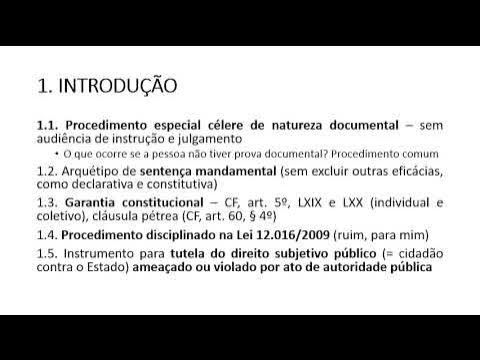Descomplicando os remédios constitucionais: aula para concursos e exame de ordem
Summary
TLDRThis video explores key legal remedies under Brazilian constitutional law, including the *mandado de segurança* (writ of security), *mandado de injunção* (writ of injunction), and *ação popular* (popular action). The *mandado de segurança* protects individuals against violations of their rights by public authorities, while the *mandado de injunção* is used when the lack of a regulatory law prevents exercising constitutional rights. The *ação popular* allows citizens to challenge actions that harm public resources, morality, the environment, or cultural heritage. This guide is invaluable for those studying for law exams or the OAB exam.
Takeaways
- 😀 Mandado de Segurança (Writ of Security) is a legal action used to protect constitutional rights, requiring filing within 120 days of discovering a violation.
- 😀 Mandado de Segurança requires an attorney, and the deadline for filing is 120 calendar days, not business days, after learning about the violation.
- 😀 Mandado de Injunção (Writ of Injunção) is used when the absence of a regulatory law makes it impossible to exercise a constitutional right, such as early retirement for public servants with disabilities.
- 😀 The judiciary can issue a decision in the absence of regulatory laws but cannot create laws. The purpose of Mandado de Injunção is to allow the exercise of rights while awaiting proper legislation.
- 😀 Ação Popular (Popular Action) allows any citizen with voting rights to challenge actions that harm public assets, administrative morality, the environment, or cultural heritage.
- 😀 The purpose of Ação Popular is to provide citizens with a mechanism for oversight and to challenge government actions that violate public interests.
- 😀 Citizens who are registered voters (i.e., have electoral rights) can file Ação Popular. Non-citizens, minors, and people without voting rights cannot file this action.
- 😀 Ação Popular can challenge illegal actions that damage public property, violate administrative integrity, harm the environment, or affect historical/cultural heritage.
- 😀 The Ação Popular does not require the citizen to prove personal harm but is focused on defending public and collective interests.
- 😀 The video emphasizes understanding constitutional remedies like Mandado de Segurança, Mandado de Injunção, and Ação Popular, which are essential for Brazilian legal practices, particularly in public law.
Q & A
What is the purpose of the 'mandado de segurança' (writ of security)?
-The 'mandado de segurança' is a legal remedy used to protect a constitutional right when it is violated by an unlawful act. It must be filed within 120 days from the date of discovering the violation.
Can the 120-day period for filing the 'mandado de segurança' be extended or interrupted?
-No, the 120-day period is non-extendable and non-interruptible. It is a strict deadline, and the 120 days are counted in calendar days, not business days.
Do you need a lawyer to file a 'mandado de segurança'?
-Yes, a lawyer is required to file a 'mandado de segurança', as it is a legal process that necessitates professional representation.
What is the purpose of the 'mandado de injunção' (writ of injunction)?
-The 'mandado de injunção' is used when a constitutional right cannot be exercised due to the absence of a law that regulates it. For example, when a constitutional right is dependent on specific laws that have not been enacted.
Can the court create laws through a 'mandado de injunção'?
-No, the court does not create laws. Instead, it issues a decision allowing the affected individual to exercise their constitutional right despite the lack of regulatory law. The court essentially provides judicial guidance in the absence of the law.
What is the main difference between 'mandado de segurança' and 'mandado de injunção'?
-The 'mandado de segurança' is used to protect a violated right from an unlawful act, while the 'mandado de injunção' is used when a right cannot be exercised because of the lack of a necessary regulatory law.
What is the 'ação popular' (popular action)?
-The 'ação popular' is a legal action that allows any citizen to challenge and annul acts that harm public property, moral administration, the environment, or cultural heritage. It serves as a tool for citizens to oversee and challenge governmental actions.
Who is eligible to file an 'ação popular'?
-Only citizens who have the right to vote, meaning individuals with a voter registration, are eligible to file an 'ação popular'. Children and non-voters cannot participate.
What are some examples of acts that can be challenged through an 'ação popular'?
-Examples include acts that damage public property, violate administrative morality (such as nepotism), harm the environment (e.g., illegal waste dumping), or destroy cultural heritage (e.g., removing historical landmarks for development projects).
How does the 'ação popular' contribute to public oversight?
-The 'ação popular' allows citizens to act as public watchdogs, challenging acts that harm public interests. It empowers individuals to take legal action to protect public goods, the environment, and administrative integrity.
Outlines

This section is available to paid users only. Please upgrade to access this part.
Upgrade NowMindmap

This section is available to paid users only. Please upgrade to access this part.
Upgrade NowKeywords

This section is available to paid users only. Please upgrade to access this part.
Upgrade NowHighlights

This section is available to paid users only. Please upgrade to access this part.
Upgrade NowTranscripts

This section is available to paid users only. Please upgrade to access this part.
Upgrade Now5.0 / 5 (0 votes)





